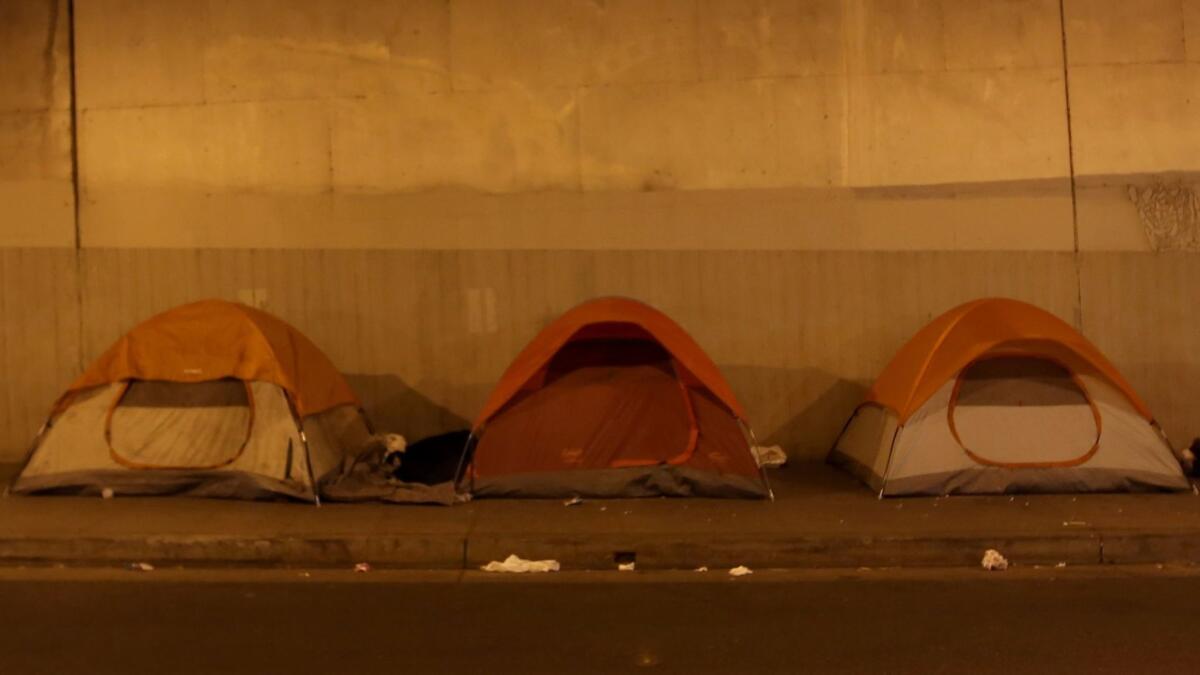Editorial: Debunking eight myths about homelessness and Proposition HHH

The city of Los Angeles has put a proposal on the ballot that could significantly reduce chronic homelessness: Proposition HHH, which would authorize $1.2 billion in general obligation bonds to fund the creation of 10,000 units of supportive housing for homeless people and affordable housing for those at risk of becoming homeless. But critics of the ambitious measure have spawned a number of myths about the homelessness problem and what the proposition would do about it. These include:
1) HHH isn’t worth passing because it won’t solve homelessness. That’s akin to arguing that we shouldn’t provide food stamps because they don’t end poverty. No single measure is going to eradicate homelessness. But creating 10,000 units of permanent supportive housing for the chronically homeless in Los Angeles is an essential first step toward significantly reducing the homeless population overall.
According to the Los Angeles Homeless Services Authority, 72% of homeless adults in the county this year have been living here for more than 20 years.
2) The city shouldn’t build housing for people who just came here to be homeless. The overwhelming majority of homeless people in L.A. did not just get here. According to the Los Angeles Homeless Services Authority, 72% of homeless adults in the county this year have been living here for more than 20 years.
3) The city doesn’t have a plan for this building program. Yes, it does. It just doesn’t look like a bond program for building, say, fire stations where every location is laid out in advance. Instead, the plan is part of the city’s multi-pronged strategy for tackling the homelessness problem. The city has identified about a dozen unused properties that it owns as potential housing sites. Others will be proposed by developers and approved by the City Council.
4) OK, but when projects get derailed, as some inevitably will be, the city will be sitting on a cache of unspent taxpayer money just waiting to be diverted to some council member’s pet project. That’s not the way the funding will work. The bonds will be sold only as needed to fund projects that have been approved. If a promising project falls apart, no bonds will be sold for it. If fewer bonds are sold, fewer taxes will be levied.
5) It will take too long to build the housing. Compared to what? Building anything in L.A. can take years from concept to grand opening. Mayor Eric Garcetti and City Administrative Officer Miguel Santana have said they want to cut the time for building supportive housing in half, so they plan to fast-track the permitting procedures. The bigger point is that this housing needs to be built, regardless of how long it takes.
6) But there’s a homelessness crisis! People need to be housed right away! Just set up trailers and modular dormitories and build more shelters. Those are all forms of temporary housing which merely get people off the street for a night or two. The goal is to get homeless people permanently housed. In the meantime, yes, there ought to be transitional housing that homeless people can go to. But many of the chronically homeless, inured to the deprivation and humiliation of living outside, would sooner stay out than go to a temporary shelter.
7) L.A. County can’t afford to provide services for all those supportive units. County health officials insist otherwise, and are drawing up a memorandum of understanding that will commit them to providing services for every supportive unit that gets built. And no project can be approved unless the developer has a service provider in tow.
8) HHH would spend too much money on homeless people. Then consider this: Not housing homeless people costs taxpayers even more — in police work, jail space, emergency room visits, and services at libraries, parks and other places where homeless people congregate. Last year, the city spent $100 million interacting with homeless people. County services for homeless people cost almost $1 billion more.
Here’s the reality: If we decide that it’s unacceptable to have people literally living on the streets, we can’t simply arrest them or coerce them into shelters. The necessary next step is to provide housing and services. It’s not cheap, but neither is the alternative.
To see The Times’ recommendations for this year’s ballot measures, visit latimes.com/endorsements.
Follow the Opinion section on Twitter @latimesopinion and Facebook
More to Read
A cure for the common opinion
Get thought-provoking perspectives with our weekly newsletter.
You may occasionally receive promotional content from the Los Angeles Times.





